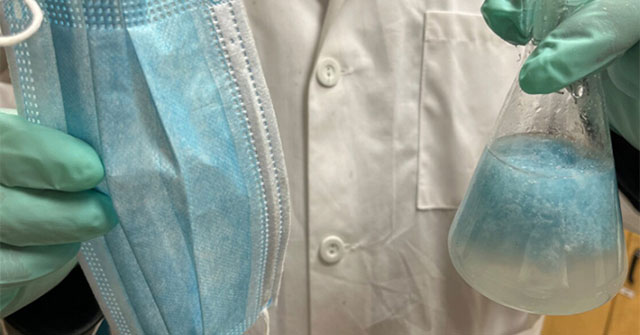Use discarded masks to make concrete
Old medical masks are chopped into fibers, treated with chemicals and then added to cement - the binding ingredient in concrete.

Scientists cut medical masks into fibers, treated with a solution of graphene oxide before mixing in cement.
Over the years, face masks have become a common type of trash. A team of experts at Washington State University (WSU) has found a new use for them, which is to increase the durability of concrete, New Atlas reported on April 28. The new study was published in the journal Materials Letters.
Previous studies have shown that concrete tends to crack less when mixed with tiny reinforcing fibers. With this information, the WSU team of experts asked whether the polypropylene or polyester fibers in the discarded masks could be used for this purpose.
To find the answer, they began processing old masks by removing the metal nose frames and cotton earloops, then splitting the rest into strands between 5mm and 30mm long. Next, the fibers were treated with a solution of graphene oxide. It forms a top coat, increasing the surface area and helping the fibers adhere to the commonly used Portland cement paste. The fibers are added to cement - the binding ingredient in concrete - in a volume of 0.1%.
Testing the fiber-reinforced cement one month after curing, the team found it had a 47% higher tensile strength than untreated Portland cement. The addition of fibers also reduces the compressive strength slightly, about 3%. "This study introduces a technology to help convert used masks from waste into something useful and of high value," said Professor Xianming Shi, who led the study.
Last year, a study conducted by a team of experts at RMIT University Australia also found that mask fibers help increase the strength of asphalt and some other road construction materials.
- Scientists have successfully developed a new type of concrete that is less prone to cracking than conventional concrete
- Masks and things to know if you do not want to harm yourself
- Do not rush to throw away the mask once when it has the following effects store behind
- Concrete is devastatingly natural as much as plastic waste
- The meaning of mask types 'obsessive people' in history
- History of the mask
- The new solution uses sparks to recycle concrete
- Japanese people rushed to buy 'freezer masks' to avoid heat
- Masks made from bra become the best selling products in Japan
- Story of concrete - king of construction materials
- 3 ways to disinfect the covid-19 epidemic respirator mask with a microwave
- Masks are hard to prevent dust and smoke effectively
 'Barefoot engineer' invents a pipeless pump
'Barefoot engineer' invents a pipeless pump Process of handling dead pigs due to disease
Process of handling dead pigs due to disease Radiometer
Radiometer Warp Engine: Technology brings us closer to the speed of light
Warp Engine: Technology brings us closer to the speed of light